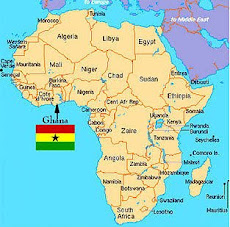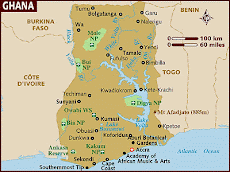Ghana recognises that gender equality is a key priority for the nation. The “millennium goals” for Ghana include:
- Eradicating extreme poverty and hunger
- Achieving universal primary education
- Promoting gender equality and empowering women
- Reducing child mortality
- Improving maternal health
- Combating HIV/AIDS, malaria and other diseases
The current measure of poverty places the upper poverty line at 403 dollars (£248 approximately) per year i.e. the equivalent amount that a person has available to spend on keeping her/himself alive. The lower poverty line is 314 dollars (£193 approximately) per year. Below this line, people are said to live in extreme poverty. The proportion of people living in poverty in Ghana, i.e. below the upper poverty line, is highest in our Upper West region at 88% of the population. Across Ghana, 18% of people live in extreme poverty.
Women and girls face discrimination in all aspects of their lives. In addition, they have to suffer a range of cultural/traditional practices, which are now illegal, but still continue, especially in the north of the country. (All the quotes below are taken from a very recent publication from UNICEF, called “Children in Ghana”.)
Women have very clearly defined roles within the family, especially in rural areas. They are essentially the “property” of their fathers and then their husbands. It is often believed that a well educated girl will not be able to get a husband and would therefore become a liability to the family. Hence, the enrolment and attendance levels for girls in school are well below those of boys:
“The gap dividing boys and girls in enrolment, completion and achievement has long highlighted a significant disparity in the education system. In many parts of the country, the barrier to girls’ education is closely linked to cultural beliefs and social expectations that do not apply to boys............. This is particularly significant in the three northern regions and in the rural areas in general, where girls face the greatest obstacles to attending school......... Parents continue to prefer investing in boys’ education, and this preference is due to the social and economic status of the boy in the family. The girl, by contrast, is often considered the man’s property...... Messages from the society and family around her are that her place is in the home and she should focus on becoming a good mother and wife.”
In the 3 northern regions, about three quarters of girls are taken out of school during the primary years.
“Studies show that the need for children’s labour is frequently cited as a key reason why poor parents fail to enrol their children in school. Girls are often kept at home to help mother raise younger siblings and carry out other domestic tasks.......Once they reach eight or ten years of age, parents often take them out of school to help at home, in the market, on the farm or elsewhere......Many parents, particularly those in subsistence agriculture make their children stay at home to work on the farm or earn money in some other way, and young girls are often taken out of school to help at home or work for others in domestic service......The poorest children are the most likely to drop out of primary school.......Across Ghana, a socio-economic divide in educational opportunity is emerging fast........This is a serious inequity issue.”
We have come across numerous examples of young girls working during the school day as hawkers, wandering the streets selling anything from chewing gum to yams. Many of those that do attend school have to get up early to collect water from the bore hole. Then they have to go hawking at the end of the school day, before returning home to carry out domestic chores.
These schoolgirls are carrying packets of water for sale. This forms part of a cottage industry, carried out by many families. Water from the bore hole is filtered and then packaged in plastic bags in the home and then sold on the streets.

Fasuma is a nine-year old girl living close to us. She seldom attends school. Each morning and evening, she has to walk to the bore hole several times, fill her bowl with water and return home.

There are many traditional practices that impact negatively on girls. Girls in many areas still have to endure female genital mutilation (FGM). Young boys and girls are also subjected to scarification, whereby various tribal cuts are made on their face and body. The majority of adults and some children in and around Wa have these scars, and this includes a number of our colleagues at the education offices. Both these practices are now illegal, but there are very few ways in which the law can be enforced, especially in the villages. Some teenage girls that spoke to us recently indicated that both these forms of abuse had been done to them. In addition, some of their scars are the results of cuts made to “release evil spirits” when they were sick.
“Some ethnic groups have a particular way of naming children who are born to a couple who have lost a number of babies in succession. It is believed in such circumstances that the same child keeps coming back into the world after dying, to torment its parents. In such cases in very traditional settings, parents may subject the child to severe scarification with ugly facial marks, and give her or him an uncomplimentary and insulting name such as “toilet” or “refuse”.”
The Government also recognises that it is important to improve water supplies and sanitation in schools, as evidence suggests that these are also factors that reduce the attendance of girls, in particular. (Across Ghana, only 58% of primary schools have toilets and only 42% provide safe drinking water.)
Another danger that female school students have to face is that of sexual harassment and abuse by male students and teachers. Ghana’s policy is that any teacher proven to have sexually abused a student will be reported to the police and the situation should not be handled internally by the education service.
“Much of the sexual abuse and exploitation of girls and women is due in part to their upbringing in a society in which male dominance and control are widely accepted, and women and girls are trained and perceived to be dependent, passive and accepting of their status..........Despite the existence of clear regulations forbidding teachers and other staff from engaging in immoral relations with pupils, some teachers pressure young girls for sex, threatening them with examination failure if they refuse, and also using corporal punishment as an opportunity to molest girls.”
Within GES, Wa, there is an excellent “Girl Child Co-ordinator”, who is working hard to raise the awareness of women and girls in schools about these issues, and to investigate any incidents of abuse. However, most girls do not report incidents for fear of shame and/or retribution.
In many areas there are traditional beliefs about “spirit children”. Children born with physical disabilities and twins, are often returned to the bush and left to die or they are ritually clubbed to death.
“Children born with physical abnormalities are often subjected to cruel treatment. For example, children born with congenital defects are seen as “spirits”, who must be returned to the bush, from where they are believed to have come. The parents of such children call upon a specialist who either administers a strong potion to kill the child or clubs the child to death with a ritual object. Among traditional homes in some regions, twins suffer a similar fate”
In the Upper East region, we visited an orphanage run by the Catholic Church and staffed by a priest and four nuns. This orphanage tries to rescue children who are being poisoned or left to die in the bush, either because they are twins or because their mothers died during or soon after childbirth. These children are believed to have caused the death of their mothers. They are said to be “cursed” and therefore the family wants to be rid of them. Orphanage staff take quick action when they hear of the death of a mother at childbirth, or of the birth of twins.

The orphanage keeps the children up until the age of 3 years. During these years, the staff try to build relationships with some members of the extended family, encouraging them to get to know the child. Then, they can usually persuade some relative to take the child, when s/he reaches 3 years of age. Below is a picture of 2 year old Jessica and her friend Benjamin at the orphanage. The possibilities of Jessica being returned to a relative are very slight. This is because an older sister took her home to the village for a visit and soon afterwards this sister also died. Therefore, no-one will have her near them. The orphanage will need to look for adoptive parents in the community.

Another illegal practice that continues in some regions is “trokosi”. This is a form of ritual slavery, where a young girl is given over to the priest of a local shrine. This is done as an offering of thanks to the gods or to ensure good fortune in some future undertaking. The girls remain in the shrine, sometimes for life.
Child betrothal and child marriage are also illegal, but continue in some areas. Poor families with daughters often do this, because the prospective husband (or husband’s family) then assume financial responsibility for food, clothing, education etc.
In this subsistence farming environment in north Ghana, women and children do most of the lifting and carrying. They walk long distance with heavy loads on their heads. Huge logs are carried, as these, together with charcoal, are the main sources of fuel for cooking.

The picture below is of Fatima outside our house. She grows paw-paw. She spends each day hawking these around the area

Each day at the GES offices, we have several women bringing food and other items for sale. We always have a supply of boiled eggs available to buy.

It is women who carry their goods to market and sell them in the market place. These pictures show the women with their market stalls, where we regularly buy our vegetables.


Ghana has made progress in recent years in passing legislation that aims to improve gender equality. However, the enforcement of the law is extremely difficult, especially in rural areas. In addition, HIV/AIDs is having a significant impact.
“The HIV/AIDs pandemic has the potential to undermine gains made in every area of national development and thus poses a unique threat to today’s children and youth.”
On World AIDs Day in December, events were held with young people throughout the country. In Wa, several hundred young people were informed by a nurse about the facts associated with contracting AIDs, and a number of the students performed plays to convey the message about safe sex. They were given the opportunity to have blood tests for HIV and several took up the opportunity.

The secondary school curriculum now includes reference to all the above issues. The government has encouraged the setting up of “girls groups” in schools, so that they can discuss these issues, support each other and educate their parents and members of the community. On a really positive note, in our work in schools, we have certainly met a number of very bright, assertive young women, who are extremely well-informed and determined to put an end to illegal practices, promote gender equality, and work towards developing their country.
.jpg)
.jpg)
.jpg)
.jpg)
.jpg)
.jpg)
.jpg)
.jpg)
.jpg)
.jpg)
.jpg)
.jpg)
.jpg)
.jpg)
.jpg)
.jpg)
.jpg)
.jpg)
.jpg)
.jpg)
.jpg)
.jpg)
.jpg)
.jpg)
.jpg)
.jpg)
.jpg)
.jpg)
.jpg)
.jpg)
.jpg)
.jpg)
.jpg)
.jpg)
.jpg)
.jpg)
.jpg)
.jpg)
.jpg)
.jpg)
.jpg)
.jpg)
.jpg)












